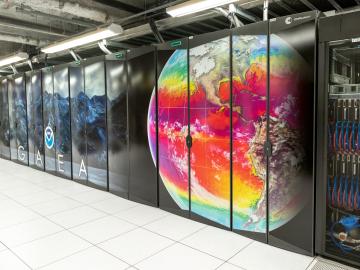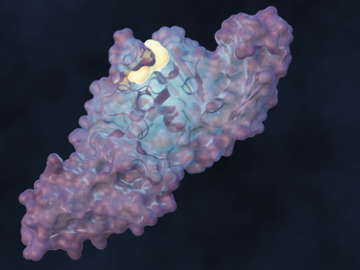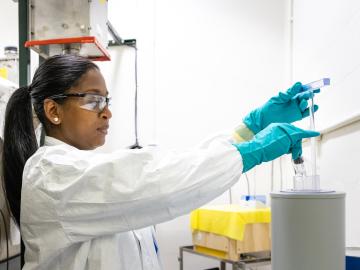
Filter News
Area of Research
- (-) Isotopes (15)
- (-) Supercomputing (73)
- Advanced Manufacturing (1)
- Biological Systems (1)
- Biology and Environment (56)
- Building Technologies (1)
- Clean Energy (63)
- Computational Engineering (1)
- Computer Science (2)
- Electricity and Smart Grid (1)
- Energy Sciences (1)
- Fuel Cycle Science and Technology (1)
- Fusion and Fission (19)
- Fusion Energy (3)
- Isotope Development and Production (1)
- Materials (76)
- Materials Characterization (2)
- Materials Under Extremes (1)
- National Security (26)
- Neutron Science (32)
- Nuclear Science and Technology (2)
News Topics
- Artificial Intelligence (14)
- Big Data (3)
- Bioenergy (2)
- Biology (4)
- Biomedical (3)
- Biotechnology (2)
- Chemical Sciences (1)
- Climate Change (10)
- Computer Science (11)
- Coronavirus (1)
- Critical Materials (1)
- Cybersecurity (1)
- Decarbonization (2)
- Energy Storage (1)
- Environment (6)
- Exascale Computing (12)
- Frontier (15)
- High-Performance Computing (18)
- Irradiation (1)
- Isotopes (8)
- Machine Learning (4)
- Materials (7)
- Microscopy (1)
- Nanotechnology (2)
- National Security (3)
- Net Zero (1)
- Neutron Science (1)
- Nuclear Energy (2)
- Physics (1)
- Quantum Computing (7)
- Quantum Science (4)
- Security (1)
- Simulation (9)
- Software (1)
- Space Exploration (1)
- Summit (6)
- Sustainable Energy (1)
- Transportation (1)
Media Contacts

Researchers at ORNL have developed a machine-learning inspired software package that provides end-to-end image analysis of electron and scanning probe microscopy images.

A team of researchers from ORNL was recognized by the National Cancer Institute in March for their unique contributions in the fight against cancer.

Using disinformation to create political instability and battlefield confusion dates back millennia. However, today’s disinformation actors use social media to amplify disinformation that users knowingly or, more often, unknowingly perpetuate. Such disinformation spreads quickly, threatening public health and safety. Indeed, the COVID-19 pandemic and recent global elections have given the world a front-row seat to this form of modern warfare.

Oak Ridge National Laboratory, in partnership with the National Oceanic and Atmospheric Administration, is launching a new supercomputer dedicated to climate science research. The new system is the fifth supercomputer to be installed and run by the National Climate-Computing Research Center at ORNL.
Xiao Wang, a research scientist at ORNL, has been named a senior member of the Institute of Electrical and Electronics Engineers, the world’s largest organization for technical professionals. Wang works in the lab’s Computing and Computational Sciences Directorate’s Advanced Computing for Health Sciences Section.

The U.S. Department of Energy’s (DOE) Innovative and Novel Computational Impact on Theory and Experiment (INCITE) program is now accepting proposals for high-impact, computationally intensive research campaigns in a broad array of science, engineering and computer science domains. Proposals must be submitted between April 10, 2023 and June 16, 2023.

ORNL has named Prasanna Balaprakash to direct its artificial intelligence efforts. The laboratory’s AI Initiative coordinates efforts across its varied research directorates to harness the power of AI and data science in tackling some

ORNL has named Michael Parks director of the Computer Science and Mathematics Division within ORNL’s Computing and Computational Sciences Directorate. His hiring became effective March 13.

A team of scientists led by the Department of Energy’s Oak Ridge National Laboratory designed a molecule that disrupts the infection mechanism of the SARS-CoV-2 coronavirus and could be used to develop new treatments for COVID-19 and other viral diseases.

A series of new classes at Pellissippi State Community College will offer students a new career path — and a national laboratory a pipeline of workers who have the skills needed for its own rapidly growing programs.


